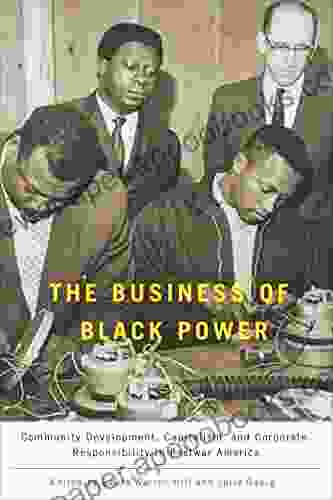Community Development Capitalism and Corporate Responsibility in Postwar America: A Historical Perspective

4.6 out of 5
| Language | : | English |
| File size | : | 14876 KB |
| Text-to-Speech | : | Enabled |
| Screen Reader | : | Supported |
| Enhanced typesetting | : | Enabled |
| Word Wise | : | Enabled |
| Print length | : | 559 pages |
In the aftermath of World War II, the United States experienced a period of unprecedented economic growth and prosperity. This growth was accompanied by a growing sense of social responsibility on the part of corporations. Many businesses began to invest in community development initiatives, such as urban renewal projects and job training programs. This trend continued throughout the 1950s and 1960s, and by the 1970s, community development capitalism had become a major force in American society.
The Rise of Community Development Capitalism
The rise of community development capitalism was driven by a number of factors. First, the postwar economic boom created a surplus of capital that corporations were willing to invest in social programs. Second, the civil rights movement and the war on poverty raised awareness of the social problems facing many American communities. Third, the federal government began to provide tax incentives and other forms of support for corporate investment in community development.
One of the most important early examples of community development capitalism was the Ford Foundation's "Gray Areas" program. Launched in 1961, the program provided grants to community development corporations (CDCs) in low-income neighborhoods across the country. CDCs were non-profit organizations that worked to improve the social and economic conditions of their communities. They provided a variety of services, including housing, job training, and education.
The Gray Areas program was a success, and it helped to inspire the creation of other CDCs across the country. By the mid-1970s, there were over 1,000 CDCs operating in the United States. CDCs played a major role in the revitalization of many urban neighborhoods, and they continue to be an important force in community development today.
Corporate Responsibility and Social Impact Investing
In addition to investing in CDCs, corporations also began to develop their own social responsibility programs. These programs took a variety of forms, but they all shared a common goal: to use corporate resources to address social and environmental problems.
One of the most important developments in corporate social responsibility was the rise of social impact investing. Social impact investing is a form of investing that seeks to generate both financial and social returns. Social impact investors typically invest in companies or organizations that are working to solve social or environmental problems. This type of investing has become increasingly popular in recent years, and it is now a major source of funding for community development initiatives.
The Future of Community Development Capitalism
Community development capitalism has come a long way since its humble beginnings in the 1940s. Today, it is a major force in American society, and it is playing an increasingly important role in addressing social and environmental problems. The future of community development capitalism is bright. As the world faces new challenges, such as climate change and income inequality, corporations and investors will need to find new ways to use their resources to make a positive impact. Community development capitalism is well-positioned to meet these challenges, and it is likely to continue to play a vital role in shaping the social and economic landscape of American communities for many years to come.
Community development capitalism is a powerful tool that can be used to address a wide range of social and environmental problems. By investing in community development initiatives, corporations and investors can make a real difference in the lives of people and communities. The future of community development capitalism is bright, and it is likely to continue to play an important role in shaping the social and economic landscape of American communities for many years to come.
References
- Ayers, Edward L. The Promise of the New Deal: The Federal Government and Social Change, 1929-1941. Oxford University Press, 1995.
- Beder, Sharon. The New Corporate Social Responsibility: Business as Partner in Social Change. Routledge, 2015.
- Blumenthal, Karen. The Political Economy of Philanthropy in the United States. Indiana University Press, 2007.
- Carlton, David L. Community Development Corporations: A History in Urban Poverty Policy. Transaction Publishers, 2010.
- Collier, Paula. The Ford Foundation: The Men and the Millions That Changed the World. Viking, 2009.
- Dowie, Mark. American Foundations: An Investigative History. MIT Press, 2001.
- Edelstein, Alex S. The Great Depression and the New Deal: The American People and the Crash and Recovery, 1929-1939. Routledge, 2019.
- Girvetz, Harry. Community Development: Creating Community Partnerships for a Better Future. Sage Publications, 2012.
- Hasenfeld, Yeheskel, and Richard A. Uba. The Social Impact of Corporate Philanthropy: Philanthropy's Role in Community Well-being. Routledge, 2015.
- Levine, Marc V. Corporate Social Responsibility: An Empirical Perspective. Edward Elgar Publishing, 2019.
- Nieves, Victor. Community Development Corporations: A Guide for Practitioners. Routledge, 2016.
- Skocpol, Theda. Protecting Soldiers and Mothers: The Political Origins of Social Policy in the United States. Harvard University Press, 1992.
- Walzer, Michael. Spheres of Justice: A Defense of Pluralism and Equality. Basic Books, 1983.
4.6 out of 5
| Language | : | English |
| File size | : | 14876 KB |
| Text-to-Speech | : | Enabled |
| Screen Reader | : | Supported |
| Enhanced typesetting | : | Enabled |
| Word Wise | : | Enabled |
| Print length | : | 559 pages |
Do you want to contribute by writing guest posts on this blog?
Please contact us and send us a resume of previous articles that you have written.
 Book
Book Novel
Novel Page
Page Chapter
Chapter Text
Text Story
Story Genre
Genre Reader
Reader Library
Library Paperback
Paperback E-book
E-book Magazine
Magazine Newspaper
Newspaper Paragraph
Paragraph Sentence
Sentence Bookmark
Bookmark Shelf
Shelf Glossary
Glossary Bibliography
Bibliography Foreword
Foreword Preface
Preface Synopsis
Synopsis Annotation
Annotation Footnote
Footnote Manuscript
Manuscript Scroll
Scroll Codex
Codex Tome
Tome Bestseller
Bestseller Classics
Classics Library card
Library card Narrative
Narrative Biography
Biography Autobiography
Autobiography Memoir
Memoir Reference
Reference Encyclopedia
Encyclopedia Grigori Grabovoi
Grigori Grabovoi Greg Nelson
Greg Nelson Gail Z Martin
Gail Z Martin Taras Kuzio
Taras Kuzio Gerald Vizenor
Gerald Vizenor Gianna Shamone
Gianna Shamone Ginger Tran
Ginger Tran Gordon Silverstein
Gordon Silverstein Jane Porter
Jane Porter Sean Michaels
Sean Michaels Maryann Crafts
Maryann Crafts Gregory Orr
Gregory Orr Garrett Sutton
Garrett Sutton Garry Wills
Garry Wills Jane Renshaw
Jane Renshaw Susan Elizabeth Phillips
Susan Elizabeth Phillips H B Gilmour
H B Gilmour Gordon Corera
Gordon Corera Gregory Feifer
Gregory Feifer Gunhild Hexamer
Gunhild Hexamer
Light bulbAdvertise smarter! Our strategic ad space ensures maximum exposure. Reserve your spot today!

 Neil ParkerImmerse Yourself in the Breathtaking Landscapes of West Bragg, the Elbow, and...
Neil ParkerImmerse Yourself in the Breathtaking Landscapes of West Bragg, the Elbow, and... D'Angelo CarterFollow ·19k
D'Angelo CarterFollow ·19k Giovanni MitchellFollow ·18.7k
Giovanni MitchellFollow ·18.7k Bob CooperFollow ·17.9k
Bob CooperFollow ·17.9k Jeffery BellFollow ·17.5k
Jeffery BellFollow ·17.5k Branden SimmonsFollow ·3.5k
Branden SimmonsFollow ·3.5k Jake PowellFollow ·18.5k
Jake PowellFollow ·18.5k Floyd PowellFollow ·12k
Floyd PowellFollow ·12k Herbert CoxFollow ·18.6k
Herbert CoxFollow ·18.6k

 Ken Follett
Ken FollettDiscover the Enchanting World of Classical Piano with "10...
A Symphony of Timeless...

 Cody Russell
Cody RussellTheo On The Ice Boston Bay Vikings: A Hockey Adventure...
Theo On The Ice...

 Nathaniel Hawthorne
Nathaniel HawthorneBach for Easy Guitar: Unleash the Genius of the Baroque...
Johann Sebastian Bach, the undisputed...

 Brenton Cox
Brenton CoxAfrican Recipes For Every Concern: Delicious,...
Embark on a Culinary Journey to the Heart of...

 Lawrence Bell
Lawrence BellEasy Guitar With Notes Tab: Your Ultimate Guide to...
Unlock the World...

 Brenton Cox
Brenton CoxCarter On The Ice: A Thrilling Sports Novel
Synopsis ...
4.6 out of 5
| Language | : | English |
| File size | : | 14876 KB |
| Text-to-Speech | : | Enabled |
| Screen Reader | : | Supported |
| Enhanced typesetting | : | Enabled |
| Word Wise | : | Enabled |
| Print length | : | 559 pages |









